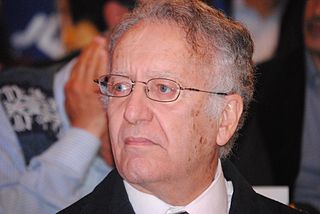
Soheib Bencheikh is an Islamic religious leader and author and would-be French politician.

Mohammed Arkoun was an Algerian scholar and thinker. He was considered to have been one of the most influential secular scholars in Islamic studies contributing to contemporary intellectual Islamic reform. In a career of more than 30 years, he had been a critic of the tensions embedded in his field of study, advocating Islamic modernism, secularism, and humanism. During his academic career, he wrote his numerous books mostly in French, and occasionally in English and Arabic.

Titus Burckhardt was a Swiss writer and a leading member of the Perennialist or Traditionalist School. He was the author of numerous works on metaphysics, cosmology, anthropology, esoterism, alchemy, Sufism, symbolism and sacred art.
The Sant'Egidio Platform of January 13, 1995 was an attempt by most of the major Algerian opposition parties to create a framework for peace and plan to end to the Algerian Civil War. The escalating violence and extremism, which had been provoked by the military's cancellation of the legislative elections in 1991 that the Islamic Salvation Front (FIS), an Islamist party, were expected to win, compelled the major political parties to unite under the auspices of the Catholic Community of Sant'Egidio in Rome. The community had previously played an important role in the drafting of the Rome General Peace Accords in 1992 which ended the civil war in Mozambique. The presence of representatives from the FIS as well as the National Liberation Front (FLN) and Socialist Forces Front (FFS) at these negotiations was extremely significant; the three parties collectively accounted for 80 per cent of the votes in the 1991 election.
Afro-Arabs are Arabs of full or partial Black African descent. These include populations within mainly the Sudanese, Emiratis, Yemenis, Saudis, Omanis, Sahrawis, Mauritanians, Algerians, Egyptians and Moroccans, with considerably long established communities in Arab states such as Palestine, Iraq, Syria and Jordan.

Malek Bennabi was an Algerian writer and philosopher, who wrote about human society, particularly Muslim society with a focus on the reasons behind the fall of Muslim civilization. According to Malek Bennabi, the lack of new ideas in Islamic thought emerged what he coined civilizational bankruptcy. He argued that in order to recover its former magnificence, Islamic society had to become an environment in which individuals felt empowered. In order to satisfy his spiritual and material needs, a Muslim needed to feel that his industry and creativity would find reward.

Benyoucef Benkhedda was an Algerian politician. He headed the third GPRA exile government of the National Liberation Front (FLN), acting as a leader during the Algerian War (1954–62). At the end of the war, he was briefly the de jure leader of the country, however he was quickly sidelined by more conservative figures.
Nader El-Bizri is the Dean of the College of Arts, Humanities, and Social Sciences at the University of Sharjah. He served before as a tenured longstanding full Professor of philosophy and civilization studies at the American University of Beirut, where he also acted as an Associate Dean of the Faculty of Arts and Sciences, and as the Director of the General Education program. El-Bizri specializes in phenomenology, Islamic science and philosophy, and architectural theory. He is the author or editor of several books, including The Phenomenological Quest between Avicenna and Heidegger (2000).

Yadh Ben Achour is a Tunisian lawyer, expert on public law and Islamic political theory. President of the Higher Political Reform Commission of Tunisia, he is then member of the United Nations Human Rights Committee.

Abbas el Hocine Bencheikh called Sheikh Abbas, was an Algerian diplomat, cleric, writer, and rector of the Muslim Institute and the Great Mosque of Paris.
Hamza Boubakeur or Hamza Al-Sid-Boubakeur,, was a French politician and Muslim cleric.

The Kingdom of the Ait Abbas or Sultanate of the Beni Abbas was a Kabyle, Berber state of North Africa, then a fief and a principality, controlling Lesser Kabylie and its surroundings from the sixteenth century to the nineteenth century. It is referred to in the Spanish historiography as "reino de Labes"; sometimes more commonly referred to by its ruling family, the Mokrani, in Berber At Muqran. Its capital was the Kalâa of Ait Abbas, an impregnable citadel in the Biban mountain range.

Mezri Haddad is a Tunisian journalist, writer, philosopher and diplomat. Haddad was a doctor of moral and political philosophy at the Paris-Sorbonne University, and the first Muslim candidate to be qualified by the National Council of French universities as a lecturer in Catholic theology. He is the author of several essays that focus on politics and religion.

Hichem Djait was a prominent historian and scholar of Islam.

André Miquel is a French Arabist and historian, specialist of Arabic literature and Arabic language.

Faouzia Farida Charfi is a Tunisian scientist, intellectual and politician. She was Minister of State for Education in 2011.

Fariba Adelkhah is a French-Iranian anthropologist and academic at Sciences Po who is currently detained in Iran.
Hocine Mezali is an Algerian journalist and writer. He had been the head of intelligence during the Battle of Algiers (1956–1957).
Mohamed El Aziz Ben Achour is a Tunisian politician and historian born on 5 January 1951; he specializes in urban, social and cultural history of modern Tunisia and the Islamic civilization. He was the Minister of Culture some time between 2004 and 2008, and later Director-General of the Arab League Educational, Cultural and Scientific Organization (ALECSO) some time between 2009 and 2013.

Saïd Djabelkhir, born on December 17, 1964, at Boufarik, is an Algerian journalist and an Islamic scholar specializing in Sufism. In 2021, he was sentenced to prison on the charge of "offending Islam".














